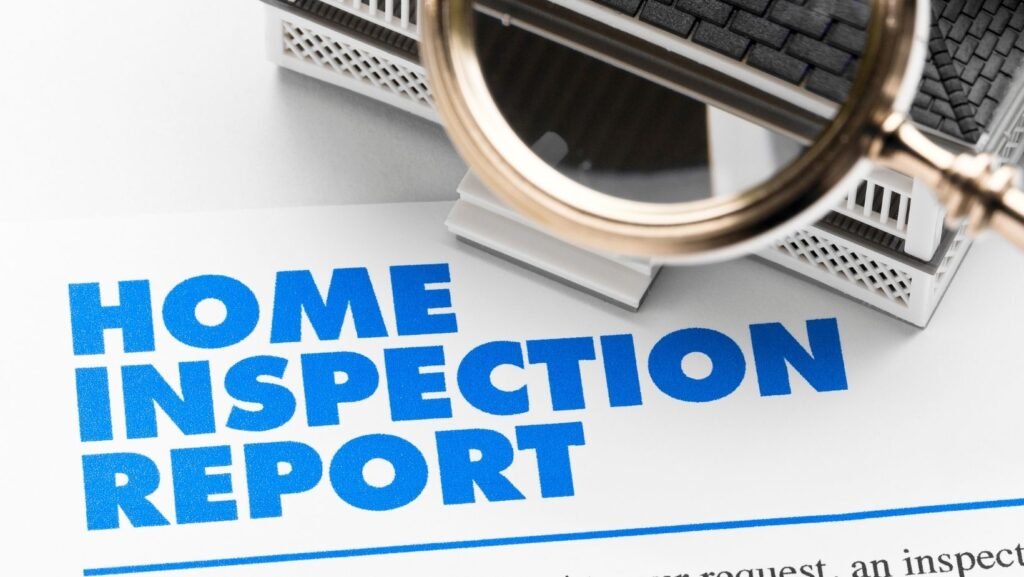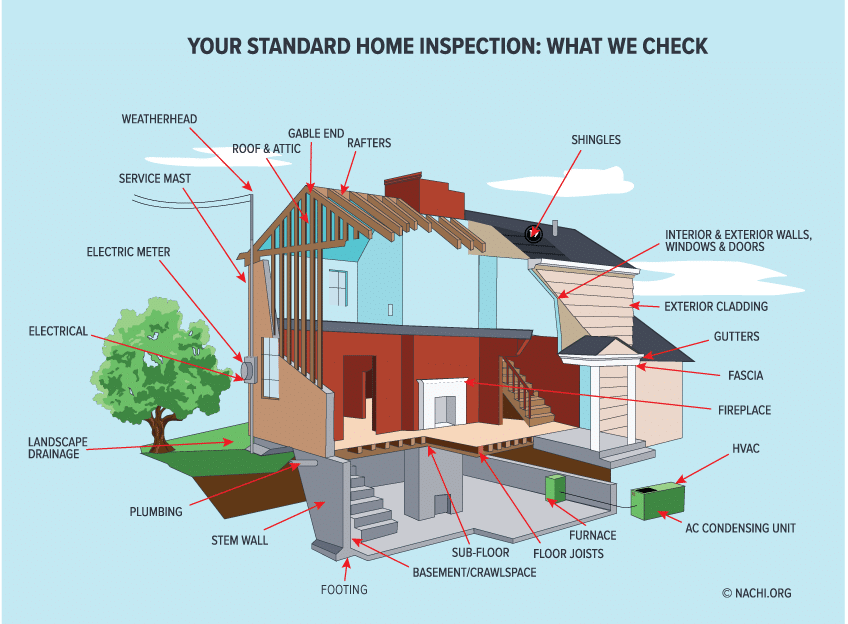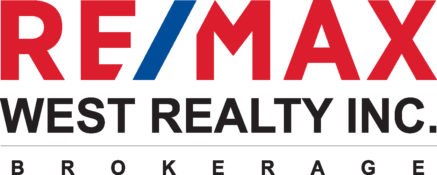
Shopping for a new home can be an exciting time for buyers. In this excitement, you may be tempted to look past potential issues with a home. Or, you may not realize those issues even exist. To avoid the surprise of purchasing a home in need of costly hidden repairs is to have the home inspected. In this article, we’ll discuss how home inspections work and provide you with a checklist of what to be on the lookout for.
A home inspection is a visual examination of a property’s condition before its sold. While home inspections aren’t required, they can be critical to ensuring you’re making a sound investment.
This is what a typical home inspection report look like – Sample Home Inspection report
What you should be looking for in home inspections
- Exterior condition
- Structural integrity
- Appliance functionality
- Heating, ventilation and air conditioning systems (HVAC)
- Interior plumbing
- Electrical systems
- Roof and attic
- Ceilings, walls, floors, windows and doors
- Foundation and basement
- Crawl spaces
- Interior and exterior drainage
It’s ideal to get the home inspected before you sign your Agreement and Purchase of Sale (APS) documents. Alternatively, you can negotiate to have your APS documents include a home inspector clause, which means your final decision is contingent upon the results of the inspection. Usually a home inspection has to happen within 7 days after you sign the APS. If the conditions are fulfilled and no issues are detected, a waiver is sent to the Seller notifying the conditions have been met.
Hiring a professional home inspector
Home buyers may choose to hire a professional home inspector or conduct the inspection themselves. Unless you’re a seasoned buyer with a deep understanding of what to look for, you may want to think twice before performing the inspection yourself. Hiring a professional means the inspection will be performed to the standards of the Canadian Association of Home & Property Inspectors (CAHPI) and International Association of Certified Home Inspectors (InterNACHI). This can provide you with invaluable peace of mind at this stage of the home buying process.
We have great home inspectors who will look at every nook and corner. If you are hiring your own, you’ll want to look for a certified inspector look for who is a member of the local or national home inspector’s trade association.
What do home inspectors look for?

While the process for a home inspection is quite standard, some details can vary depending on the city or province. The inspection may also vary depending on who is inspecting your home and the procedures set out by their particular organization and/or licensing bodies.
That said, here are some items typically included in your standard home inspection.
The Exterior Home
Exterior Walls
The inspector will look for any missing pieces or cracks in the walls. They’ll also check to see if there’s any soil too close to the bottom of the house, as this may lead to water damage or attract wood-destroying insects like termites.
House Foundation
Because much of the foundation typically isn’t visible from the exterior of the house, the inspector won’t be able to inspect it. However, they will be able to look for secondary evidence of foundation issues, such as cracks or settling.
Roof And Related Features
The process of inspecting a roof includes looking for any missing, deteriorated or damaged shingles. Inspectors may also look underneath shingles to check for any water damage that might need repairing.
Roofs are also commonly checked for construction type, flashing and any attached gutters. Keep in mind though, that having an inspector up on the roof doesn’t mean you have any kind of guarantee or certification of its integrity.
If there’s a chimney, the inspector will need to make sure the flashing around it is also watertight and that the bricks and stone are in good condition. If there’s a fireplace, that will also need to be inspected.
Porches, Patios and Decks
Your home inspector will ensure any porches, patios or decks are structurally sound. Specifically, they’ll look for cracks in the foundation, rotting wood or anything else that could cause them to be unsafe. If possible, they’ll inspect underneath these structures to ensure there’s no separation from the house or issues that may be visible only from a different angle.
Garage and Driveway
Your inspector will examine floors, gas proofing, openers and automatic closers. They will also check for roof damage, installation issues that could cause water leaks and see if the garage has a firewall.
They should also assess the condition of the driveway and check for evidence of cracks or deteriorating asphalt.
Grading
The inspector will determine whether the property is sufficiently graded away from the house. Essentially, they’ll want to see enough of a slope to keep water draining away from the home’s foundation. If there’s no grade at all, water could pool near the home and cause damage. A negative grade could cause water to drain toward the home, which further increases the risk of water damage.
The inspector will also look around the yard or garden for any moist spots that could be a sign of drainage issues.
Interior Home Inspection
Inspection of a home’s interior will typically involve the following elements.
Interior Walls
The walls inside the home may look fine on the surface, but they could be hiding some nasty secrets inside. Make sure your home inspector uses an infrared camera to look for potential water damage within the walls or on surfaces.
Your inspector will also be on the lookout for lead paint in older homes, as its presence can pose serious health risks.
Windows and Doors
Your home inspector will look for any problems with the caulking and anything that might suggest rotten wood hiding beneath. As part of this process, they will trying to determine if the windows are new or old, so they can recommend replacements or upgrades.
Flooring
Inspectors take note of a home’s flooring to check any real wood elements for evidence of carpenter bees, carpenter ants, beetles or termites. As the top layer of finished flooring is the only part the inspector can check visually, the other portion of this inspection will be looking for soft spots or issues with the subfloor, which can cause more damage if not detected.
Ceilings
Examining ceilings involves looking for cracks in the plaster, as well as any loose or sagging areas that could be cause for concern. It’s also good practice to look for stains, exposed hardware, mechanical damage and evidence of previous repairs.
Attic
The attic should be checked for adequate ventilation and insulation. An inspector should also check for any evidence of water damage, which could indicate an issue with the roof or another external feature.
Plumbing
As part of a standard home inspection, the inspector will check toilets, sinks, tubs, showers, faucets and taps (but not sewers). They should also turn on the taps and let them run to see if they’re in good condition – and to check water pressure. The inspector should also keep an eye out for copper pipes and any faulty connector joints. Lastly, they should also examine the water heater to make sure it’s in working order.
Electrical Systems
An electrical inspection will typically consist of checking the service entrance, amperage and voltage of service, main and distribution panels, main shut off, receptacles, polarity and grounding, switches and light fixtures. They will also check branch circuit conductors and their over current protection. Your inspector will want to make sure everything is up to code and safe.
HVAC Systems
Inspection of the HVAC systems entails determining how old the furnace and air conditioner are, whether they’re functioning as they should be, if they’re correctly installed and if any repairs should be recommended based on that information.
Appliances
A check of appliances isn’t always part of a home inspection, so if you’re purchasing a house that comes with the appliances and you plan to keep them, be sure to do a check yourself if the inspector doesn’t provide that service. This means examining the washer and dryer, refrigerator, stove, oven and even microwave.
Bathrooms
Your home inspector will check the toilet installation, looking for any potential leaks. They will also ensure each bathroom has adequate ventilation, as bathrooms without windows may develop mold or mildew without it.
Basement Or Crawl Space
Home inspectors will check the basement walls and flooring to check for any visible signs of water penetration, dampness, mildew or mold. Some inspectors will use a meter to determine the level of moisture in a space.
Too much moisture can be a cause for concern, as it can break down building materials and attract unwanted pests. If any exposed earth is found in crawl spaces or basements, it should be covered in plastic to manage the moisture.
What Home Inspectors Typically Don’t Look For
Most general home inspectors won’t check for issues such as these:
- Sewer or septic system problems
- Asbestos
- Radon
- Methane
- Radiation
- Lead (except for lead paint)
- Pests, such as rodents
- Wood-destroying organisms
- Mold, mildew and fungi (beyond what’s immediately visible)
Separate Inspections
If you’re buying an older home, you may want to have your sewer or septic systems inspected separately, as this can provide valuable information about the pipes used in your home and what condition they’re in.
Additionally, if you want more detailed information about your roof (like a roof certification from the roofing company or a guarantee about its condition), you’ll need to hire a separate service.
When it comes to the property itself, home inspections don’t usually include looking at the property beyond checking for spots that may show signs of drainage or grading issues. If you want a full property survey, you’ll have to hire an additional professional to get this completed.
Home Inspection Checklists
Whether you’re checking a professional inspector’s work or doing the inspection yourself, you’ll want to track what’s inspected.
While the following checklists are by no means comprehensive, they may be helpful as a general guide to what to look for.
Exterior Home Inspection Checklist
| Exterior Items For Inspection | Inspected? |
| Exterior walls | [ ] |
| House foundation | [ ] |
| Roof | [ ] |
| Gutters | [ ] |
| Chimney | [ ] |
| Porch, patio or deck | [ ] |
| Garage | [ ] |
| Driveway | [ ] |
| Grading | [ ] |
Interior Home Inspection Checklist
| Interior Items For Inspection | Inspected? |
| Interior walls | [ ] |
| Windows and doors | [ ] |
| Flooring | [ ] |
| Ceilings | [ ] |
| Attic | [ ] |
| Plumbing | [ ] |
| Toilets | [ ] |
| Sinks and faucets | [ ] |
| Tubs and showers | [ ] |
| Water heater | [ ] |
| Electrical systems | [ ] |
| HVAC systems | [ ] |
| Appliances | [ ] |
| Washer and dryer | [ ] |
| Refrigerator | [ ] |
| Oven and stove | [ ] |
| Microwave | [ ] |
| Bathrooms | [ ] |
| Basement or crawl space | [ ] |
Non-Standard Home Inspection Checklist
| Items Not Included In Standard Inspection | Inspected? |
| Sewer and/or septic system | [ ] |
| Asbestos | [ ] |
| Radon | [ ] |
| Methane | [ ] |
| Radiation | [ ] |
| Lead | [ ] |
| Pests (e.g., rodents) | [ ] |
| Wood-destroying organisms | [ ] |
| Mold, mildew and fungi | [ ] |
How Much Does A Home Inspection Cost?
On average, a home inspection costs roughly $500-$1,000 (depending on the inspectior) – and the home buyer is typically responsible for covering the expense. The exact cost of your home inspection will depend on several factors:
- Home size
- House type (condo, townhouse, etc.)
- Home age
- Geographic location
- The cost of living in your area
While this may seem like a big expense, a home inspection has the potential to save you money in the long run – especially if it helps you avoid a home with too many issues. If you’re concerned about your budget, be sure to get a quote first to avoid any surprises.
Also, bear in mind that additional inspection services like roof certification and radon testing will come at an additional expense.
The Bottom Line
Getting a home inspection is a crucial step in ensuring the home you’re purchasing is safe and up to code. It should also help reduce surprise expenses after you close. Whether you’re buying your first house or your third, you’ll likely benefit from a home inspection.
Search for the perfect home in our property search and if you we can fiannce it as well, offering a complete solution at The York Realtors


